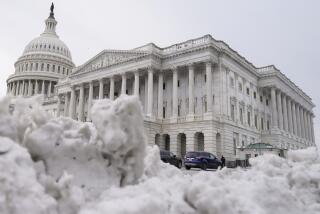Bush Signs Bill Setting Farming Subsidies
- Share via
WASHINGTON — WASHINGTON -- President Bush on Monday signed a $190-billion farm bill guaranteeing higher subsidies to growers in Midwestern and Southern states where key political races will decide which party controls Congress next year.
At an early morning ceremony, Bush said the six-year bill “will provide a safety net for farmers, and will do so without encouraging overproduction and depressing prices”--a position contrary to what administration officials argued when the bill was being written.
The subsidies could help Bush in his quest to win back control of the Senate for the GOP, while giving him a chance to rack up IOUs for his own 2004 reelection effort.
“If he had vetoed it, it would have been very disappointing,” said Minnesota farmer Nathan Johnson. “In the 2000 election, almost all of the agricultural areas voted for President Bush. They expected his support ... and we certainly have gotten it.”
Some senators already are making plans to provide farmers with even more money in the form of a disaster-aid package for weather-related damage to 2001 crops.
The farm law will increase spending by nearly 80% over the cost of existing programs at a time when the president has been calling on lawmakers to show fiscal restraint. The bill is estimated to cost $190 billion over the next 10 years, although the programs must be renewed after six.
The farm bill raises subsidy rates for grain and cotton growers and revives a target-price system abolished by the 1996 Freedom to Farm Law to provide supplemental income when commodity prices are below certain levels.
The bill also brings back subsidies for wool and honey producers and provides new payments for milk, peanuts, lentils and dry peas.
More to Read
Sign up for Essential California
The most important California stories and recommendations in your inbox every morning.
You may occasionally receive promotional content from the Los Angeles Times.













